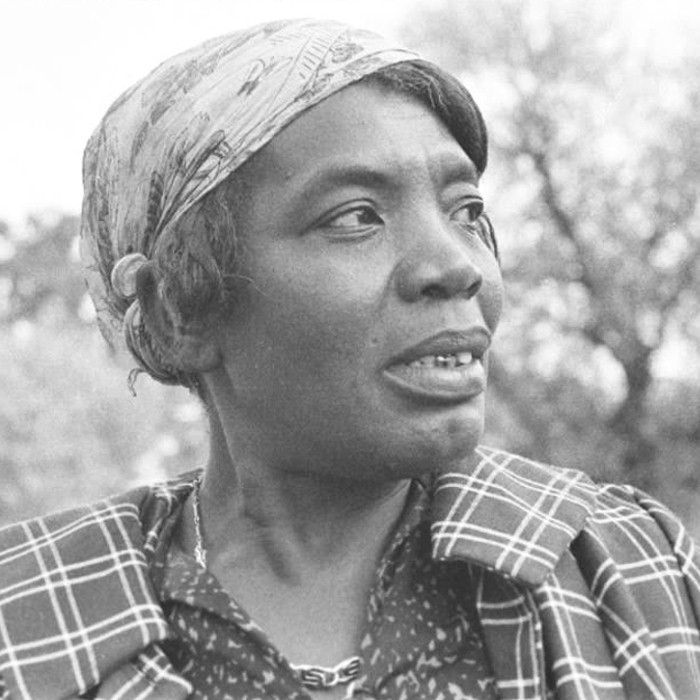Members
1 Female
Origin
 ---
---
Genre
---
Style
---
Mood
---
Born
1 Female
Origin
Genre
---
Style
---
Mood
---
Born
1902
Active ---
![]() 1984
1984
Cutout![]()
3 users
Artist Biography
Available in:
Bessie Jones (February 8, 1902 - July 17, 1984) was an American gospel singer from Smithville, GA. She learned her songs from her grandfather, a former slave born in Africa. She was a founding member of the Georgia Sea Island Singers.
Alan Lomax first encountered Bessie Jones on a southern trip in 1959, Jones made her way up to New York City two years later and asked Lomax to record both her music and biography.
Jones told an interviewer in Alachua, Florida in the early 1980s, that she was born in Lacrosse, Florida, (Alachua County), when that area was a tung oil production area. Jones also said she hadn't been to a doctor since 1925 and that she wore many copper bracelets which protected her from disease.
Jones' 1960 song "Sometimes" was heavily sampled in American electronica musician Moby's 1998 single "Honey".
Partial discography
Southern Journey Recordings, V. 12, Georgia Sea Islands: Songs and Spirituals (Rounder 1712)
Southern Journey Recordings, V. 13, Earliest Times: Georgia Sea Island: Songs for Everyday Living (Rounder 1713).
Put Your Hand On Your Hip, and Let Your Backbone Slip: Songs and Games from the Georgia Sea Islands (Rounder 11587) 2001
Step It Down (Rounder) 1979
So Glad I'm Here (Rounder 2015) 1974
Additional Reading:
Although closely associated with the unique music of the Georgia Sea Islands, singer Bessie Jones was not actually born on the islands, but in a small mainland Georgia town. As a young woman she moved to the islands and became an intrinsic part of the cultural life there. Located directly off the Georgia coast, these islands represent a small but fascinating chapter in American history, a bit of which bears repetition to fully understand Jones' background.
Once the site of large plantations, the islands were seized by the Union in 1861, early in the Civil War. It was a strategic location from which the Union could easily blockade shipments that were headed to the rebellious Southern states. The original landowners had fled, leaving something in the neighborhood of 10,000 former slaves behind. These people became part of what was known as the Port Royal Experiment, a chance to see what fate would bring to the newly freed slaves. Since the Northern army had consistently rejected the enlistment of black soldiers, the governing and security of the Georgia Sea Islands was handed over to locally enlisted citizens, meaning that for the first time in American history, African-Americans were allowed to protect themselves.
From the end of the Civil War until the '30s, these islands enjoyed a period of isolation from mainland life. During these years, a further cultural blend took place between the descendents of two sets of former slaves: the Afro-Americans and a huge group of former slaves from the Bahamas who traveled there following the abolishment of slavery in the British empire.
The Sea Islanders, having suffered captivity, enjoyed the release of their bonds and created a music of endurance and freedom utilizing the unique dialect of the islands. There was a strong influence of the Bahamas in this music. And although all American folk music has been influenced by various types of African music, the African content of the Georgia Sea Islands is of a much purer variety; the result is a style of music unlike any other in America or the world.
Jones became a shining representative of this musical heritage, singing in a Bahamian accent accompanied by wild, outrageous African handclap rhythms. In the '60s, she helped form the Georgia Sea Island Singers, recording both with them and as a soloist. The material in both cases includes both songs and a selection of musical games for children that she recalled from her past. These performances brought audiences face to face with a distinct culture from another century. Jones published a book entitled Step It Down, which is a collection of such children's games as well as various stories from her life. Her performances, recordings, and educational programs earned many awards, including a National Heritage Fellowship from the National Endowment for the Arts. Like all great folk artists, her voice has continued ringing on since her death. She perhaps may not have had much in common with the rap and techno music of the '90s, but the techno recording artist Moby chose to sample her voice on his recordings.
Wide Thumb
Clearart
Fanart

Banner
User Comments
 No comments yet..
No comments yet..
